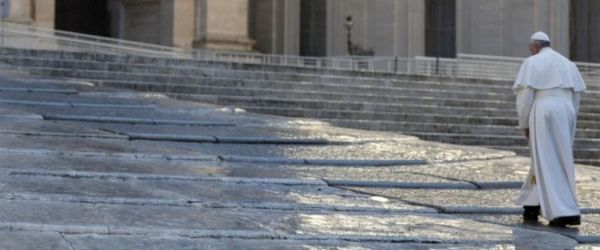In today’s Gospel Reading (cf. Mt 5:13-16), Jesus says to his disciples, “You are the salt of the earth. … You are the light of the world” (vv. 13-14). He uses a symbolic language to indicate to those who intend to follow him some criteria for living presence and witnessing in the world.
First image: salt. Salt is the element that gives flavour and which conserves and preserves food from corruption. The disciple is therefore called to keep society far from the dangers, the corrosive germs which pollute the life of people. It is a question of resisting moral degradation, sin, bearing witness to the values of honesty and fraternity, not giving in to worldly flattery of careerism, of power, of wealth. “Salt” is the disciple who, despite daily failures — because we all have them — gets up again from the dust of his errors, and begins again with courage and patience, every day, to seek dialogue and encounter with others. “Salt” is the disciple who does not look for consensus and praise, but strives to be a humble, constructive presence, faithful to the teachings of Jesus who came into the world not to be served, but to serve. And there is a great need for this attitude!
The second image that Jesus proposes to his disciples is that of light: “You are the light of the world”. Light disperses darkness and enables us to see. Jesus is the light that has dispelled the darkness, but it [darkness] still remains in the world and in individuals. It is the task of Christians to disperse it by radiating the light of Christ and proclaiming his Gospel. It is a radiance that can also come from our words, but it must flow above all from our “good works” (v. 16). A disciple and a Christian community are light in the world when they direct others to God, helping each one to experience his goodness and his mercy. The disciple of Jesus is light when he knows how to live his faith outside narrow spaces, when he helps to eliminate prejudice, to eliminate slander, and to bring the light of truth into situations vitiated by hypocrisy and lies. To shed light. But it is not my light, it is the light of Jesus: we are instruments to enable Jesus’ light to reach everyone.
Jesus invites us not to be afraid to live in the world, even if sometimes there are conditions of conflict and sin there. In the face of violence, injustice, oppression, the Christian cannot withdraw into self or hide in the security of his own enclosure; the Church also cannot withdraw into herself, she cannot abandon her mission of evangelization and service. Jesus, at the Last Supper, asked the Father not to take the disciples out of the world, to leave them, there, in the world, but to guard them from the spirit of the world. The Church expends herself with generosity and tenderness towards the little ones and the poor: this is not the spirit of the world, this spreads light, it is salt. The Church listens to the cry of the least and the excluded, because she is aware that she is a pilgrim community called to prolong Jesus Christ’s saving presence in history.
May the Blessed Virgin help us to be salt and light in the midst of the people, bringing to everyone, by example and word, the Good News of God’s love.
[Pope Francis, Angelus, 9 February 2020]












